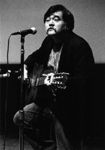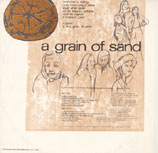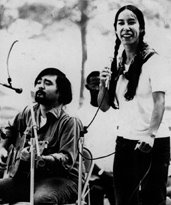 Remembering Chris Iijima - By Phil Tajitsu Nash, Jan 11, 2006
Remembering Chris Iijima - By Phil Tajitsu Nash, Jan 11, 2006from Common Dreams website
In his 20s, he sang "Free the Land" from concert stages. In his 50s, he wrote law review articles that protested the theft of Hawaiian ancestral lands. In between, Chris Kando Iijima married, raised two sons and worked as a teacher, lawyer, bartender, community organizer and law professor. By the time he died on December 31, after a long illness, Iijima had fulfilled a promise he had made to himself in a song he had recorded in 1973: Don't forget to live before you die.
Chris's youth was shaped by an event before his birth, the unjust imprisonment of his family and other Japanese Americans during World War II. Chris's father, Tak Iijima, fought in the famous 442nd Regimental Combat Team, the all-Nisei unit that took exceedingly heavy casualties in Europe to prove their loyalty to America.
When he entered Columbia University in 1965 on what could have been a ticket to professional respectability, Chris was already skeptical about America's unfulfilled promises to its minorities. His mother Kazu, whose 1986 interview in Amerasia Journal was entitled "Always A Rebel," had been a lifelong progressive activist. He shared her view that fundamental changes were needed in American society before workers and minorities could find justice.

Columbia in the late 1960s was also the scene of strong anti-Vietnam War protests and some of the most powerful East Coast stirrings of the nascent Asian American movement. Chris found his voice as a pamphleteer, organizer, speaker and visionary for both movements, while also developing his gifts as a poet, songwriter, guitar player and singer.
With a love of music that came from a dad who was a classically trained musician and church choirmaster, Chris wrote songs that, even today, are good enough for Broadway or the Top 40. Listen to the toe-tapping "Dust Don't Fly Away" on his 1982 Back-to-Back album or "Free the Land" on the landmark 1973 Grain of Sand album (http://www.bindurecords.com/music/grainofsand).
His husky voice, charismatic stage presence, and funky picking skills virtually jump out of the speakers.
[for a great review of the album see Color Lines Magazine - Dancing Between the Notes by Gary Phillips - eric]
Chris, Joann Nobuko Miyamoto and "Charlie" Chin toured the country and campuses in the early 1970s, singing songs and expressing an Asian American identity that was, to use Chris's own words, "originally meant to be a means to an end rather than an end in itself. It was as much a mechanism to identify with one another as [it was] to identify with the struggles of others, whether African Americans or Asians overseas. It was less a marker of what one was and more a marker of what one believed."
In 1973, the trio entered a recording studio and cut "A Grain of Sand: Music for the Struggle by Asians in America." This album, which is recognized as a staple of American folk culture and sold in the gift shop of the Smithsonian Institution, was more than just grooves on a piece of vinyl. From Boston to Chicago, to San Francisco to Honolulu, Asian-derived people who had been classified in the Census as "Other" suddenly realized that they had an identity, a history and a place at the table.

After working as a teacher for several years, Chris enrolled in law school. He rose rapidly, becoming a judicial clerk, a lawyer and then a law professor. At the time of his death, he was not only a law professor at the University of Hawaii, but also head of its pre-admission program.
One of the most compelling songs co-written by Chris on the Grain of Sand album is the "Foolish Old Man Who Removed Mountains." It is based on a Chinese fable about a man who decides to move the two mountains that block the sunlight from reaching his house. Each day, he carries buckets of dirt, while his neighbors laugh, saying there is no way that one small man can remove such huge mountains. He replies, "When I die, my children will dig after me. And when they die, their children will carry on. With every shovel full, the mountains become lower. Why can't we remove them?"
 Like that old man, Chris spent his life removing the "mountains" of racism, sexism and greed. While he did not live to see his task completed, his example inspires the rest of us to carry on.
Like that old man, Chris spent his life removing the "mountains" of racism, sexism and greed. While he did not live to see his task completed, his example inspires the rest of us to carry on.xxxxxxxxxxx
Celebrations of Chris's life are being planned for Hawai'i, Los Angeles and New York, and photos, video, audio and memorabilia about his life are being collected. To participate, or to make a memorial donation in his name, please contact mailto:karenishizuka@hotmail.com.
Phil Tajitsu Nash is CEO of CampaignAdvantage.com and co-author of "Winning Campaigns Online."

No comments:
Post a Comment